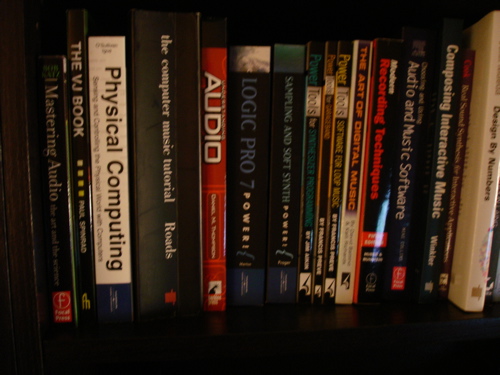It’s easy to miss stories among the various cool distractions on Matrixsynth, like videos of synth pioneers Laurie Spiegel and Suzanne Ciani. So, I can’t help but point to Matrix’s extended review of my book, along with some words from me about why I wrote it, even though self-promotion makes me feel funny. Why? Because I think Matrix has something great to say about books and general. And because I couldn’t be happier to be reading some new books like the ones pictured beelow, now that I’ve finished mine:
Real World Digital Audio review, interview [Matrixsynth]

*Disclaimer: Boookshelf pictured does not represent the wall-obliterating shelf space in my apartment.
What’s striking to me is that Matrix went through and reviewed each chapter individually, something a reviewer normally would never do. It’s funny, because you hear so much about digital supplanting the Web. But I think the Web demonstrates how important books and print are — and vice versa. Writing on the Web is social and interactive; writing print tends to be fairly lonely but more contemplative. The forms and styles are different, too. But the bottom line is, you can learn and experience something different through books, as Matrix says:
I find that I spend most of my time behind a monitor. Being able to take some time off and kick back with a paperback filled with all of this information was refreshing.
I’ve been really reliant on books lately for learning, as I work on developing interactive 3D visual compositions in Max/MSP/Jitter. In the past couple of months, I’ve poured through Foundation Actionscript Animation by Keith Peters, O’Reilly’s JavaScript Definitive guide, the OpenGL red book, and Peachpit’s C Programming: Visual Quickstart Guide, all of which are indispensible for learning 3D in Jitter even though none is dedicated to the application specifically. I think, frankly, there aren’t enough books that deal with underlying techniques rather than an app du jour. And I can personally never get enough of print, even though I know book and magazine sales were down in the last quarter of 2005. (I don’t blame blogs for that, incidentally.)
I’d also be nowhere without books that come on paper. Had I been reading about C on the subway today on a Sony Reader instead of folding a book over my arm while I hung onto the handrail, would it have been the same experience? Hardly. (I probably would have dropped it.) Likewise, while I’ve learned a lot from application-specific books, my favorites remain those that look more generally at technique.
Let’s put a little of these two media together now: got a favorite book for learning about music production? Or are you looking for a specific topic, but haven’t found one that fits it?